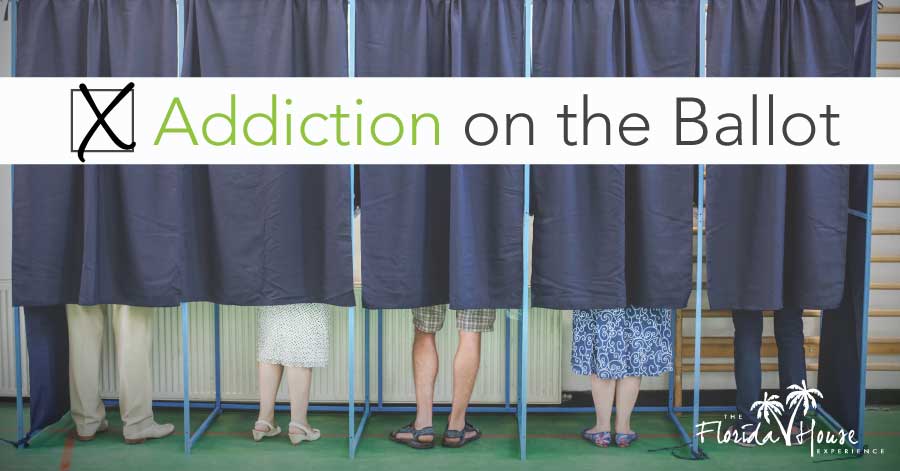
Addiction has become a hot-button topic during the 2018 election cycle, and there’s a number of initiatives on the table that could have a big impact on our recovery community.
Here at FHE Health, we’ve taken a hard look at some of the most prominent addiction-related initiatives across the country. We’ve examined the various amendments and ballot measures, and reviewed the impact they might have on both members of the recovery community and people who will need addiction services in the future.
Here’s what we found:
Denver Ballot Initiative Seeks To Turn Tax Dollars Into Treatment Programs
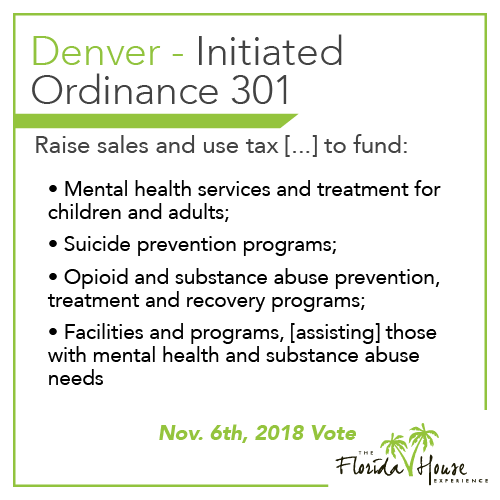
Caring 4 Denver is a group of citizens, mental health and addictions specialists, members of the recovery community, and politicians (including Rep. Leslie Herod (D)) who want to improve funding for mental health, substance abuse, and suicide prevention, treatment, and aftercare programs in Denver. They’ve spearheaded Denver Ordinance 301 – a ballot initiative that would add a 0.25 percent sales tax, or 25 cents on every $100-dollar purchase to the existing sales tax in the city in order to raise an estimated $45 million dollars each year.
So far, it looks like support for Ordinance 301 is strong in the Mile High City, with more than double the required number of voters backing the ballot access.
In Ohio, Bipartisan-Backed Amendment Proposes Reduced Penalties for Drug Offenders
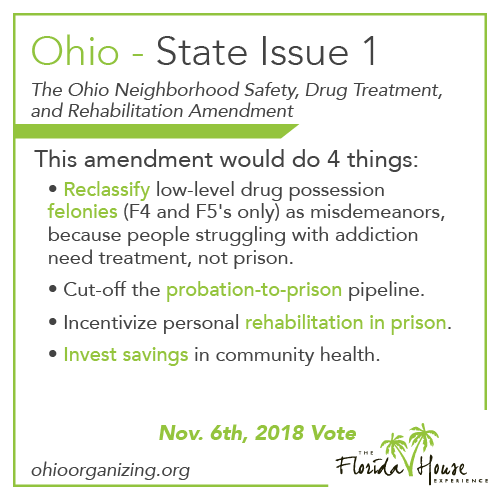
Under the initiative, possessing, obtaining, or using illegal drugs would be reduced to a misdemeanor offense with a maximum of 180 days in jail and a $1000 fine, while repeat offenders could only be sentenced to probation rather than incarceration.
State Issue 1 also includes a clause that allows felons convicted of drug offenses the opportunity to reduce their jail time by up to 25 percent if they participate in rehab programming. In an effort to reduce the non-violent prison population in Ohio, the initiative would give people currently in jail for drug-related crimes the chance to ask the court to reclassify their offense as a misdemeanor. If this initiative passes, these individuals will be released from prison.
Advocates point out the amendment includes a clause to funnel any financial savings realized by reducing the prison population back into addiction treatment programs and victim’s funds.
Politically, Ohio Issue 1 is controversial, with each gubernatorial hopeful taking a strong stance. Mike DeWine, the former Ohio Attorney General and Republican candidate for the governor’s office, is quoted as saying the amendment “would be ‘devastating,’ arguing that it would attract more drug dealers to the state.” In contrast, the Democratic gubernatorial candidate Richard Cordray supports the initiative, saying it would be a smart approach to crime, allocation of tax dollars, and rehabilitation.
Florida Looks at Restoring Voting Rights, Banning Indoor Vaping and Offshore Drilling – In Two Amendments
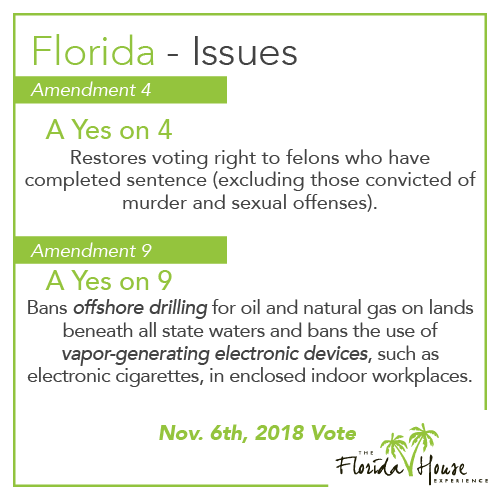
And while FL 4 has received most of the attention during the 2018 campaign, there’s another amendment on the ballot which may hit close to home for people dealing with addictions. Florida Amendment 9 supports the ban of offshore drilling for oil and natural gas in waters within the state limits, while the same amendment also includes a clause to “ban the use of vapor-generating electronic devices, such as electronic cigarettes, in enclosed indoor workplaces“.
Those in the ‘Yes on 9’ camp point out that offshore drilling could have a significant, negative impact on the tourist trade in Florida, given the fact that the beaches and waterways draw millions to the state each year. With regards to the ban on vaping, it’s viewed as simply an extension of existing laws that prohibit indoor smoking.
Voters who oppose Amendment 9 see this initiative as a clear example of ballot issue bundling – the combining of two otherwise unrelated issues in order to confuse voters by mixing a public health law (banning indoor vaping) with a measure related to oil drilling.
The Opioid Crisis Is On Everyone’s Mind… And The Government Finally Took Action
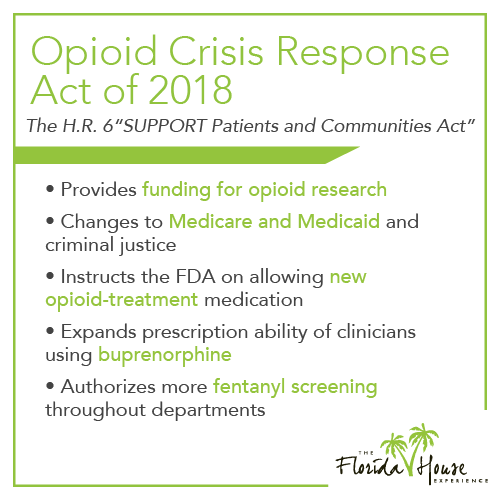
Although the package doesn’t include any new funding, it does open the doors for addiction research grants, and “creates, expands and reauthorizes programs and policies across almost every federal agency, aiming to address different aspects of the opioid epidemic“.
One of the most significant elements of the bill is a change in the way the U.S.P.S. handles overseas packages – namely, envelopes hailing from China. Postal authorities are now required to screen international mail for fentanyl, which is often concealed inside letters, cards, and envelopes – a move that is credited to Sen. Rob Portman (R-Ohio) who raised red flags about the opioid crisis during his 2014 election campaign.
What is notable is the exclusions – particularly the omission of the Association of American Medical Colleges (AAMC)-endorsed Opioid Workforce Act of 2018 which would add 1,000 residency spots in addiction medicine, pain management, and addiction psychiatry.
The unprecedented bipartisan support for the anti-opioid legislation is widely seen as a positive step in terms of preventing overdose deaths. It’s also regarded as a strategic move by politicians on both sides of the aisle who are facing increased scrutiny from voters demanding real action on the opioid crisis.
Opioid Abuse A Trending Issue Nationwide – Individual Politicians Promise Action
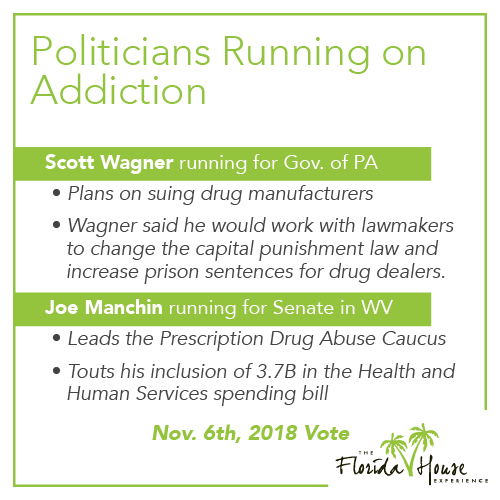
The Wall Street Journal reports that as of mid-September, 2018, political ads referencing opioids were running in 25 states. By comparison, during the 2014 campaign opioids were only mentioned in ads in one state, Kentucky.
In Pennsylvania, Republican Scott Wagner is running for governor and he’s clear in his critique of Gov. Tom Wolf’s track record on the opioid crisis. If elected, Wager plans to introduce the death penalty for drug dealers, increase law enforcement efforts, and even sue the drug companies with money from the state’s anti-poverty, stopgap Cash Assistance Program.
In many ‘red states’, Democratic candidates are leveraging their efforts to address opioid abuse in an effort to win votes, including in West Virginia and Missouri, where opioid death rates continue to rise. Democrat Joe Manchin III has emphasized his work to pass legislation that would make it easier for medical providers to track substance abusers, while Republican Patrick Morrisey’s campaign ads counter the Democrats’ efforts by highlighting his work to sue pharmaceutical distributor McKesson.
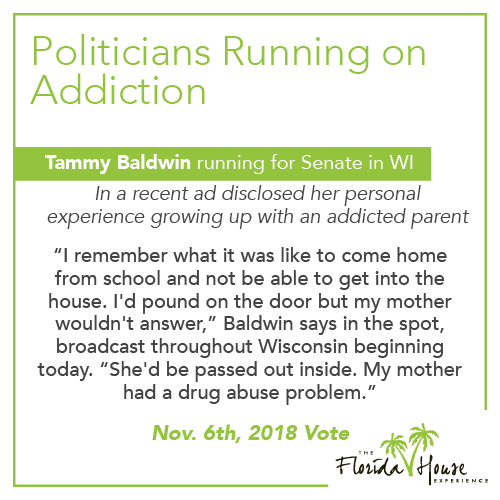
Pollster and associate professor of political science Jason Husser says, “one thing that stood out to me is just how little variation there is…..across party lines. Dealing with this issue (opioid crisis) has support from both parties“. It’s now up to voters within the recovery community to decide which party is likely to implement laws that deliver real, measurable results for people living with substance abuse and mental health concerns.
Connect With The Recovery Community
To learn more about the 2018 midterm election issues could impact addiction treatment options, overdose rates, and members of the recovery community, join the conversation here at our FHE alumni group.






